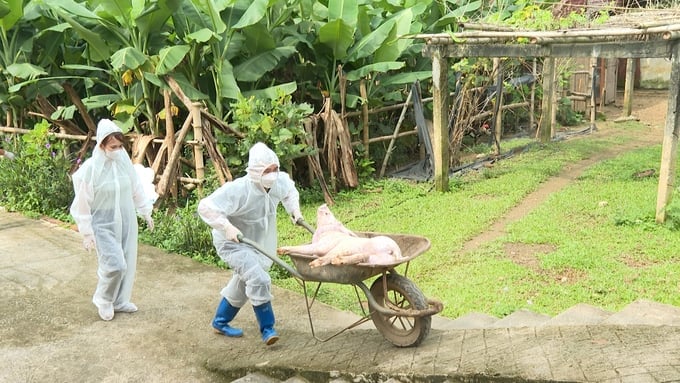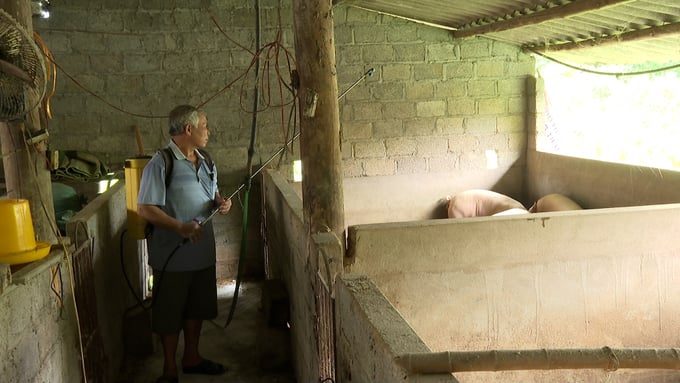June 1, 2025 | 07:01 GMT +7
June 1, 2025 | 07:01 GMT +7
Hotline: 0913.378.918
June 1, 2025 | 07:01 GMT +7
Hotline: 0913.378.918
As of July 3, Bac Kan province has reported African swine fever outbreaks in 97 out of 108 communes, resulting in the deaths of 14,230 pigs and the disposal of nearly 554 tons of carcasses. Consequently, communes within the province will face the risk of losing their pig herds entirely.
Notably, there is a lack of prohibition on trading activities and checkpoints for controlling pig transportation in several affected communes. In contrast, during the African swine fever outbreak that occurred four years prior, Bac Kan established multiple checkpoints province-wide; the disease prevention and control efforts also saw the participation of various stakeholders.

African swine fever continues to spread in Bac Kan province. Photo: Ngoc Tu.
Dinh Van Huan, Vice Chairman of Hoa Muc Commune People's Committee in Cho Moi district, acknowledged the lack of severity in the commune's current disease prevention measures compared to previous outbreaks. The commune primarily focused on warning local residents against selling infected pigs, and providing instructions on the disinfection and disposal of dead pigs.
"The commune's disease prevention measures for this year has not been as strict as those in 2019 and 2020. During those years, control checkpoints were established along inter-district and inter-provincial roads; however their current absence poses a significant challenge," Vice Chairman Huan remarked.
Due to the lack of control checkpoints, local residents continue to engage in the trading of infected pigs. On social media platforms, traders openly post information regarding the sales of infected pigs in Bac Kan province. Traders also discreetly distribute leaflets to purchase infected pigs from residents in the affected areas.
The majority of the infected pig transactions occur during the onset of the outbreak with purchases made at night, which complicates control efforts. Multiple livestock households with infected or suspected pigs have promptly sold their herds at low prices to recover investments.
Without checkpoints at transportation gateways, pig transportation control relies exclusively on the two Animal Quarantine Stations in Cho Moi district, located on National Highway 3 (BOT Cho Moi - Thai Nguyen route and the former National Highway 3). These checkpoints are responsible for controlling the transportation of animals and animal products across the borders of Bac Kan province.
According to Nguyen Thanh Tam, Head of the Cho Moi Animal Quarantine Station, the station operates with a staff of 5 officers who rotate shifts 24/7 at two checkpoints. However, he highlighted the challenges in monitoring caused by the station's lack of authority to stop vehicles for inspection. Consequently, only voluntary vehicles are subject to inspection and subsequent disinfection.
For vehicles attempting to bypass the station, the officers notify the traffic police for assistance. However, coordination is not always possible as enforcement becomes ineffective when the vehicles reach Thai Nguyen's jurisdiction.
"Inter-sectoral forces were previously stationed at the checkpoints; however, in recent years, these forces have withdrawn, leaving only veterinary officers. As a result, inspection and control efforts face significant challenge, especially when vehicles suspected of transporting livestock deliberately evade our checkpoint," Tam shared.

The Cho Moi Animal Quarantine Station faces significant challenges in controlling pig transportation during the outbreak due to its limited workforce. Photo: Ngoc Tu.
In response to the debilitating impacts of African swine fever on Bac Kan's livestock sector, the Ministry of Agriculture and Rural Development noted that the province has failed to officially declare district or province-wide outbreaks; or organize disease prevention measures in compliance with regulations. Consequently, the continued sales of infected or suspected pigs, along with the transportation of pigs, exacerbated the widespread disease transmission.
Moreover, the majority of livestock farmers in Bac Kan failed to comply with hygiene, disinfection, and biosecure farming practices. Despite the availability of an African swine fever vaccine, which has produced exceedingly positive results in protecting the pig herds in Bac Kan and neighboring regions, over 99% of the local pork pigs have not received their vaccination.
Accordingly, the Ministry of Agriculture and Rural Development has requested Bac Kan to declare district and province-level outbreaks to enhance disease prevention and control measures. However, to date, the province has only declared outbreaks at the commune level.
Regarding the province's reluctance to declare a province-wide outbreak, Ha Sy Huan, General Director of Bac Kan province's Department of Agriculture and Rural Development, commented that the establishment of checkpoints and trading prohibition is not an effective long-term solution.
The province is facing an economic challenge involving the disposal of over 500 tons of infected pigs, which constitutes a small proportion of the local pig herd. The official declaration of a province-wide outbreak and the establishment of control checkpoints, similar to previous outbreaks, may significantly impact the local economy.

Small-scale pig farming activities will continue to be prevalent in Bac Kan province. Photo: Ngoc Tu.
General Director Huan asserted that the establishment of control checkpoint is impractical due to the extensive network of provincial and national highways, as well as the numerous minor roads across the province. When farmers deliberately sell infected pigs and evade law enforcement, they typically avoid major routes and opt for smaller pathways. Consequently, efforts to monitor all possible route is unrealistic.
On the other hand, the declaration of a province-wide outbreak can potentially halt all pig sales in Bac Kan; thereby severely affecting all farms, households, businesses, and cooperatives that have invested in pig farming, implemented effective disease prevention measures, and vaccinated their herds. Consequently, healthy pigs will be unmarketable, leading to significant economic losses. Specialists are researching to consult the Provincial People's Committee on disease prevention and control measures for the immediate future.
According to the General Director Huan, the province houses a limited veterinary workforce with only 12 personnel. Similarly, Cho Moi district's agricultural service center only employs one intermediate veterinary officer.
As a result, the agricultural sector is unable to effectively control the outbreak without assistance; it requires decisive action from local authorities and administrations. General Director Huan also noted that several local governments have failed to prioritize or effectively manage disease prevention and control efforts.
He added that small-scale pig farming activities will continue to be prevalent in Bac Kan province for the foreseeable future. Fundamental solutions are necessary to effectively prevent and control local outbreaks.
Accordingly, local farmers must comply with safe and biosecure farming practices. Notably, biosecure farming involves constructing facilities that meet technical and hygiene requirements; and regularly conducting detoxification and disinfection procedures.
Additionally, comprehensive vaccination is a long-term solution. Despite the extent of the outbreak, multiple households, cooperatives, and farms in Bac Kan province that fully vaccinated their herds report healthy growth among the pigs.
According to General Director Huan, the local government and specialists will hold an online meeting with its communes to assess recent disease prevention efforts, identify challenges, and establish plans to promptly control and eradicate the disease.
Translated by Nguyen Hai Long

(VAN) Several scientists and farmers are experimenting with soil treatment in some key durian-growing regions such as Cai Lay (Tien Giang), Dak Song, Gia Nghia, and Dak R’lap (Dak Nong).
/2025/05/25/4127-3-073637_820.jpg)
(VAN) Thanks to the promotion from an FAO-implemented project, vegetable production in greenhouses in Moc Chau has seen strong development, from 1.5 hectares in 2021 to nearly 50 hectares in 2024.

(VAN) FAO has recently supported USD 140,000 to implement the project 'Risk mitigation human-animal interface risks through disease control initiatives in pig farming.'

(VAN) The People's Committee of Tra Vinh province has approved an adjustment to the investment policy for the Green Hydrogen Plant project, increasing its area to approximately 52.76 hectares.
![Reducing emissions from rice fields: [2] Farmers’ commitment to the soil](https://t.ex-cdn.com/nongnghiepmoitruong.vn/608w/files/news/2025/05/05/dsc08881jpg-nongnghiep-140632.jpg)
(VAN) Clean rice cultivation model in Thuong Tan commune, Bac Tan Uyen district, is assisting local residents in achieving sustainable agriculture by substantially reducing costs, increasing productivity, and protecting the environment.

(VAN) At the conference to disseminate Resolution No. 68, AgriS introduced its digital agricultural ecosystem and reaffirmed its commitment to accompanying the Government in promoting private sector development and sustainable agriculture.

(VAN) 'Blue Ocean - Blue Foods' initiative is designed to restore marine ecosystems and establish sustainable livelihoods for local communities by cultivating a minimum of 1,000 hectares of cottonii seaweed in the first three years.